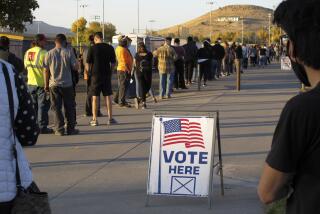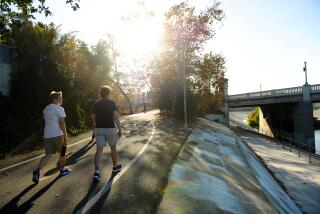Voting, traffic deaths linked
- Share via
CHICAGO — Could voting for president be hazardous to your health?
An analysis of election day traffic deaths dating to Jimmy Carter’s 1976 win suggests yes, but the authors say that’s no reason not to go to the polls.
The study found that, on average, 24 more people died in car crashes during voting hours on presidential election days than on other Tuesdays in October and November. That amounts to an 18% higher risk of death. Compared with nonelection days, an additional 800 people suffered disabling injuries.
The results were pretty consistent on all eight presidential election days that were analyzed, up to George W. Bush’s victory over John F. Kerry in 2004.
“This is one of the most off-the-wall things I’ve ever read, but the science is good,” said Roy Lucke, senior scientist at Northwestern University’s Center for Public Safety.
Lucke was not involved in the study, which appears in today’s Journal of the American Medical Assn.
Rushing to get to polling places before or after work, driving on unfamiliar routes, and being distracted by thinking about the candidates were among possible reasons cited by the study’s Canadian researchers.
Coauthor Dr. Donald Redelmeier, a professor of medicine at the University of Toronto, said he and co-researcher Robert Tibshirani, now at Stanford University, were motivated in part out of concern about the public health implications of traffic accidents.
Such accidents claim about 1 million lives worldwide each year, including 41,059 last year in the United States, which has one of the highest traffic death rates among industrialized countries.
Other analyses have found that traffic deaths go up when more people are on the road, as during the summer, or during festive times when alcohol use increases, such as holidays, said Ellen Martin of the National Highway Traffic Safety Administration.
Anne McCartt, senior vice president for research at the Insurance Institute for Highway Safety, called the study “a clever example of something that is commonly known in highway safety.”
McCartt noted that schools often have election day off, and stores sometimes have special sales, both of which can contribute to extra traffic.
The study is based on the highway traffic safety agency’s fatal crash data.
Redelmeier said voters can easily avoid the risks by not speeding and by wearing seat belts and avoiding alcohol use before driving.
More to Read
Get the L.A. Times Politics newsletter
Deeply reported insights into legislation, politics and policy from Sacramento, Washington and beyond. In your inbox twice per week.
You may occasionally receive promotional content from the Los Angeles Times.










